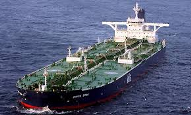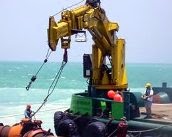Royal Dutch Shell Plc postponed a project designed to boost natural gas recovery from its Ormen Lange deposit offshore Norway, citing higher costs and doubts on reserves.
“The oil and gas industry has a cost challenge,” said Odin Estensen, chairman of the Ormen Lange Management Committee, in a statement. “This, in combination with the maturity and complexity of the concepts and the production volume uncertainty, makes the project no longer economically feasible.”
Shell and other oil companies including Statoil ASA are cutting spending amid rising costs and stagnating oil and gas prices. The delay at Ormen Lange, which delivers as much as 20% of the UK’s gas consumption, comes as the standoff between Russia and the European Union over the annexation of Crimea has raised concerns over fuel supplies to Europe.
The delay on the compression project was supported by partners Statoil, Dong Energy A/S and Exxon Mobil Corp. It was opposed by Norway’s state-owned Petoro AS, also a partner. Prime Minister Erna Solberg this month warned companies against “unacceptable” delays to recovery projects, saying they risk damaging the goodwill they enjoy from the government.
Shell shares dropped 0.6% to 2,200 pence as of 10:18 a.m. in London. Statoil fell 0.8% to 165.4 in Oslo.
The partners remain committed to maximizing recovery at Ormen Lange “in a sustainable manner,” said Shell, the operator of Norway’s second-largest gas field.
Norway, western Europe’s largest oil and gas producer, has seen output drop 20% over the past decade. The government is pushing for companies to maximize recovery from existing fields instead of moving on to more profitable projects. Statoil, Norway’s largest producer, has also announced it’s reviewing plans to build a new platform at the North Sea Snorre deposit to extract an additional 300 MMbbl of oil.
Shell said the timing of the Ormen Lange compression project wasn’t critical to the ultimate recovery rate at the field. “We’re fully aligned to the government’s steer to increase the recovery factor,” Kitty Eide, a company spokeswoman, said in an emailed reply to questions.
In a letter to the government in February, Shell said that a tax increase last year on oil and gas companies will make the Ormen Lange project less profitable, echoing other companies that have warned the change would hurt marginal projects.
“It’s not a deciding factor, but did not help the economics of the project,” Eide said. The company declined to provide details on investment or production-volume estimates for the compression project, or when the license partners expected to make a decision on a future project, she said.
Benchmark gas prices in the UK, where Ormen Lange’s production is shipped through the 1,200-km (745 mi) Langeled pipe, the world’s second-longest pipeline, have fallen 24% so far this year.
The field was discovered in the Moere basin of the Norwegian Sea in 1997 and started producing 10 years later. Output reached 21.5 Bcm of gas last year, a fifth of Norway’s total production. Remaining reserves were estimated at 194.5 Bcm of gas at the end of 2013, down from an initial 314.6 Bcm, according to the Norwegian Petroleum Directorate.
The project delay has no implications for current production, Shell’s Eide said.
Troll, Norway’s largest gas field, has remaining reserves of 955 Bcm. Troll produced 29.6 Bcm of the fuel last year.
Shell and its partners had been studying two offshore compression solutions -- either a subsea concept or a platform -- to compensate for declining pressure over time.
Petoro, which manages Norway’s direct stakes in offshore fields, shares Shell’s view that the current concepts for compression were unprofitable, making a postponement reasonable, Sveinung Sletten, a spokesman, said by phone. The company didn’t support the operator’s decision because it lacked clear plans for future compression projects, he said.
“We haven’t been presented with good enough plans for how the operator will continue its work on compression,” he said. “We want a stronger commitment, and we want sufficient resources allocated to the upcoming work to secure the extraction of remaining profitable resources at Ormen Lange.”
Oslo-based Aker Solutions ASA, which designed a pilot project for Ormen Lange seabed compression, said it wouldn’t comment on the internal decision-making process. The company also worked on the world’s first subsea gas compression facility at Statoil’s Aasgard field in the Norwegian Sea.
“Although delayed, subsea compression at Ormen Lange remains an opportunity for us in the future,” Bunny Nooryani, an Aker Solutions spokeswoman, said in an email.
Norwegian weekly Teknisk Ukeblad reported last month that FMC Corp. had beaten Aker Solutions to an initial contract on the Ormen Lange compression system.
Aker Solutions slid 2.3% to 90.3 kroner in Oslo trading.
Providing useful resources, articles and writings on crude oil, other petroleum products, energy and gas. By Blockline and Associate Ltd Nigeria Ltd, online.

 Nigeria Bonny Light Crude Oil (BLCO, FLCO and ALCO, etc): We sell mostly on FOB, CIF, TTO and TTT/STS Basis.
Nigeria Bonny Light Crude Oil (BLCO, FLCO and ALCO, etc): We sell mostly on FOB, CIF, TTO and TTT/STS Basis. We sell and lease tug-boats of all kinds.
We sell and lease tug-boats of all kinds.
